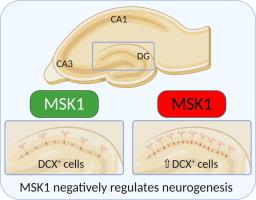Neuroscience ( IF 3.3 ) Pub Date : 2020-11-24 , DOI: 10.1016/j.neuroscience.2020.11.017 Oladiran I Olateju 1 , Lorenzo Morè 2 , J Simon C Arthur 3 , Bruno G Frenguelli 4

|
Neurogenesis in the subgranular zone (SGZ) of the adult hippocampus can be stimulated by a variety of means, including via exposure of experimental animals to an enriched environment that provides additional sensory, social, and motor stimulation. Tangible health and cognitive benefits accrue in enriched animals, including the amelioration of signs modelling psychiatric, neurological and neurodegenerative conditions that affect humans, which may in part be due to enhanced production of neurons. A key factor in the neuronal response to enrichment is the release of brain-derived neurotrophic factor (BDNF) and the activation of the Mitogen-Activated Protein Kinase (MAPK) cascade, which can lead to the stimulation of neurogenesis. Mitogen- and Stress-Activated protein Kinase 1 (MSK1) is a nuclear enzyme downstream of BDNF and MAPK that regulates transcription. MSK1 has previously been implicated in both basal and stimulated neurogenesis on the basis of studies with mice lacking MSK1 protein. In the present study, using mice in which only the kinase activity of MSK1 is lacking, we show that the rate of cellular proliferation in the SGZ (Ki-67 staining) is unaffected by the MSK1 kinase-dead (KD) mutation, and no different from controls levels after five weeks of enrichment. However, compared to wild-type mice, the number of doublecortin (DCX)-positive cells was greater in both standard-housed and enriched MSK1 KD mice. These observations suggest that, while MSK1 does not influence the basal rate of proliferation of neuronal precursors, MSK1 negatively regulates the number of cells destined to become neurons, potentially as a homeostatic control on the number of new neurons integrating into the dentate gyrus.
中文翻译:

有丝分裂原和应激激活蛋白激酶 1 负调控海马神经发生
可以通过多种方式刺激成年海马颗粒下区 (SGZ) 的神经发生,包括将实验动物暴露在提供额外感觉、社交和运动刺激的丰富环境中。丰富的动物会产生切实的健康和认知益处,包括改善影响人类的精神、神经和神经退行性疾病的体征,这可能部分是由于神经元的产生增加。神经元对富集反应的一个关键因素是脑源性神经营养因子 (BDNF) 的释放和丝裂原活化蛋白激酶 (MAPK) 级联反应的激活,这可导致神经发生的刺激。丝裂原和应激激活蛋白激酶 1 (MSK1) 是调节转录的 BDNF 和 MAPK 下游的核酶。基于对缺乏 MSK1 蛋白的小鼠的研究,MSK1 先前与基础和刺激的神经发生有关。在本研究中,使用仅缺乏 MSK1 激酶活性的小鼠,我们表明 SGZ(Ki-67 染色)中的细胞增殖率不受 MSK1 激酶死亡(KD)突变的影响,并且没有浓缩五周后与对照水平不同。然而,与野生型小鼠相比,标准饲养和富集的 MSK1 KD 小鼠中双皮质素 (DCX) 阳性细胞的数量更多。这些观察结果表明,虽然 MSK1 不影响神经元前体的基础增殖率,


























 京公网安备 11010802027423号
京公网安备 11010802027423号